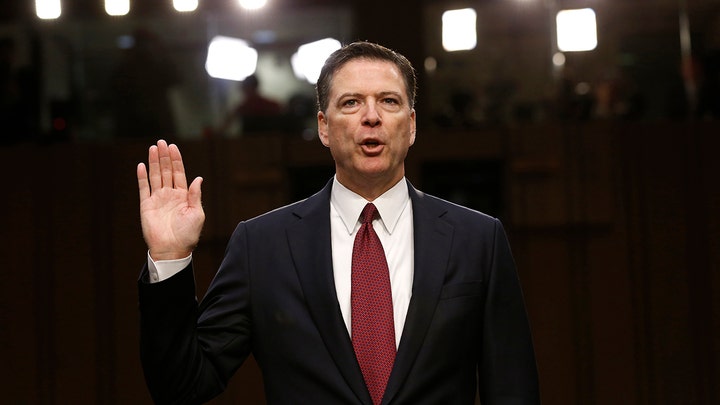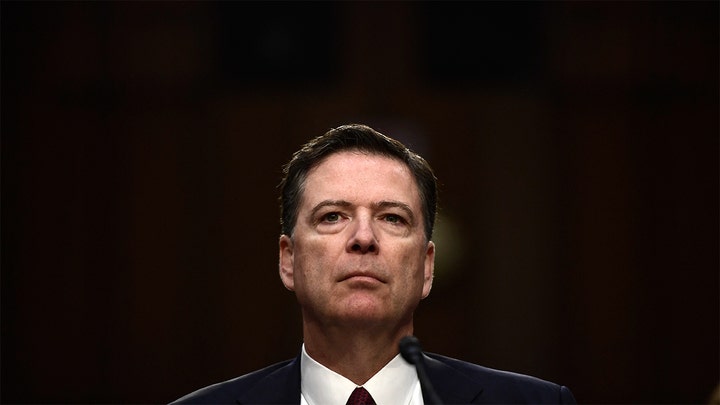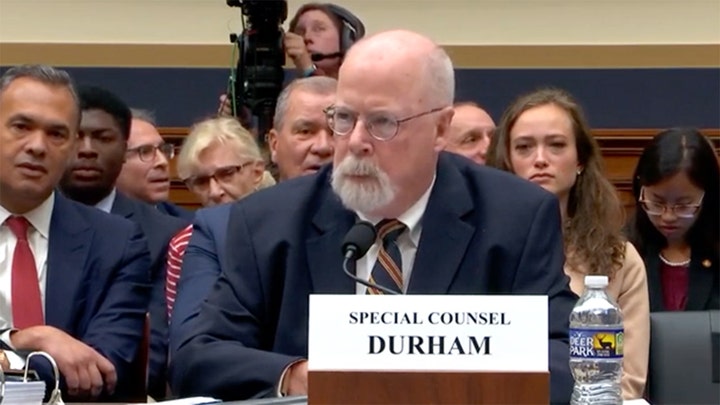Bombshell: Ex-FBI Chief James Comey Hit With Federal Indictment on Two Criminal Counts
Historic indictment raises questions about law, politics, and democracy in America

On September 25, 2025, American politics was shaken when news broke that former Director of the Federal Bureau of Investigation James Comey had been indicted by a federal grand jury in the Eastern District of Virginia on two criminal counts. The indictment, only two pages long, immediately triggered a wave of reactions across Washington and beyond, not simply because of its content but because of the symbolism attached to it. For the first time in modern history, a man who once led the FBI, one of the most powerful law enforcement agencies in the United States, now stood on the other side of the justice system, facing the prospect of becoming a criminal defendant in a federal case. This remarkable turn of events has raised questions not only about Comey himself but also about the role of politics in the American justice system, the balance of powers, and the health of the country’s democracy.
The charges against Comey are twofold. The first accuses him of making false statements to Congress, a serious federal crime under U.S. law. Specifically, prosecutors allege that when Comey testified before the Senate Judiciary Committee on September 30, 2020, he was asked whether he had ever authorized any FBI official to serve as an anonymous source for the press in order to leak investigative information. Comey responded “no,” but according to the indictment, he knew at the time that his statement was false. The government’s case is built on the claim that he had, in fact, authorized such a disclosure in at least one instance, and that by denying it under oath he committed a crime. The second charge is obstruction of a congressional proceeding. Prosecutors argue that by denying and misrepresenting facts during sworn testimony, Comey obstructed the ability of Congress to carry out its oversight role. Together, these charges carry a maximum penalty of up to ten years in prison, though the likelihood of such a severe sentence remains uncertain.
What makes this indictment particularly intriguing is that the grand jury declined to approve a third charge that prosecutors had sought. That proposed charge stemmed from another statement Comey made during a separate congressional hearing concerning intelligence requests from 2016. By rejecting that count, the grand jury signaled that it was not willing to rubber-stamp the entire package presented by prosecutors, suggesting that even within the jury room there was debate about how far to go. This in itself highlights the fragility of the government’s case, which relies heavily on demonstrating intent and knowledge, two of the hardest elements to prove in a perjury or false statement case.

To fully appreciate the weight of this development, it is impossible to ignore the political backdrop. James Comey’s name has been linked inextricably with Donald Trump’s presidency and the tumultuous politics that surrounded it. In May 2017, Trump abruptly fired Comey as FBI director, in the midst of the Bureau’s investigation into Russian interference in the 2016 election and potential links to the Trump campaign. That firing became a pivotal moment, leading directly to the appointment of Special Counsel Robert Mueller and years of political and legal battles. Comey later published memoirs in which he sharply criticized Trump, portraying him as a leader with authoritarian instincts, unconcerned with the norms of democracy, and more interested in personal loyalty than the rule of law. Trump, in turn, repeatedly denounced Comey as part of the so-called “deep state,” accusing him of conspiring to undermine his presidency.
Given that history, the 2025 indictment cannot be seen in a vacuum. Many observers immediately interpreted it as the culmination of years of pressure from Trump and his allies, who had long called for Comey to face consequences. Reuters and other international outlets noted that in recent months Trump had intensified his calls for the Justice Department to prosecute those he accused of politically motivated investigations against him. That Comey is the first to be indicted among that group is being celebrated by Trump loyalists as vindication, while critics see it as a dangerous politicization of the legal system.

Comey himself wasted little time responding. Shortly after the indictment was unsealed, he released a video statement on social media declaring his complete innocence. He insisted that he never intentionally lied to Congress and that the prosecution was driven not by evidence but by politics. He expressed faith in the American justice system, saying that he would fight to clear his name and that he trusted the courts to ultimately deliver justice. His tone was defiant but also measured, seeking to reassure supporters that he would face the charges head-on.
The indictment also reverberated within Comey’s personal circle. His son-in-law, Troy Edwards Jr., was until recently a federal prosecutor in the Eastern District of Virginia, the very office that returned the indictment. Almost immediately after the charges were announced, Edwards resigned from his post, a move widely interpreted as an effort to avoid the appearance of conflict of interest. This resignation underscores how the ripple effects of the case extend beyond the courtroom and into the personal and professional lives of those connected to Comey.
From a legal perspective, the case presents several unusual features. First, the timing is striking: the alleged false statements were made in 2020, and the indictment was issued in late September 2025, just days before the five-year statute of limitations would have expired. This has fueled speculation that prosecutors were racing against the clock, perhaps at the urging of political figures. Second, the challenge of proving intent looms large. To convict Comey, the government must demonstrate not only that his statement was false but that he knowingly and willfully lied. In practice, this is difficult, since defendants often claim faulty memory or confusion rather than deliberate deceit. Third, the very legitimacy of the Justice Department is at stake. If the public perceives the prosecution as politically motivated, confidence in the impartiality of the legal system could be deeply eroded. Conversely, if prosecutors manage to prove their case convincingly, the outcome could reinforce the principle that no one, not even the former head of the FBI, is above the law.
Reactions have predictably fallen along partisan lines. Republicans close to Trump have hailed the indictment as overdue accountability. They argue that Comey misused his office, undermined public trust, and sought to sabotage Trump, and that facing charges is a form of justice. Some Republican lawmakers even declared that the indictment would help restore faith in the justice system. Democrats, on the other hand, see it as a blatant political vendetta. They contend that Comey is being punished not for crimes but for his role in investigating Trump, and that the Justice Department has been weaponized against Trump’s critics. Legal scholars and commentators have voiced concern that criminalizing ambiguous testimony before Congress sets a dangerous precedent. If officials fear that an imprecise or faulty recollection might later be prosecuted as perjury, they may be reluctant to testify candidly, weakening congressional oversight.
Internationally, major newspapers like the Financial Times, the Washington Post, the Associated Press, and Reuters have framed the case as emblematic of the deep divisions in American politics. They note the unusual spectacle of a former FBI director being charged and the degree to which the process seems inseparable from partisan battles. The symbolism, they argue, will resonate far beyond the courtroom, influencing how the United States is perceived abroad in terms of the rule of law.
Looking to history, there are precedents for high-ranking officials facing legal jeopardy after leaving office, though rarely under circumstances quite like this. Richard Nixon resigned in 1974 amid the Watergate scandal to avoid impeachment, but he was later pardoned by his successor, Gerald Ford, and never faced trial. Bill Clinton was accused of perjury in the Monica Lewinsky scandal, but he too avoided criminal prosecution after his presidency. The Iran-Contra affair of the 1980s saw some CIA officials and members of the Reagan administration indicted, though many had their convictions overturned or sentences commuted. In comparison, the indictment of Comey is striking because it involves the FBI itself, an institution that has long cultivated an image of being above politics, committed solely to law enforcement. For its former leader to be branded a criminal defendant sends a powerful and unsettling message.
The potential consequences of the case are vast. Politically, it is likely to deepen polarization in an already divided country, especially with elections looming. Trump and his supporters will use it as proof that the “witch hunt” against him has backfired, while opponents will see it as evidence that the justice system has been hijacked. For the Justice Department and the courts, the trial will be a test of credibility. If the evidence is thin and the case collapses, critics will argue that the prosecution was a sham. If, however, the evidence is compelling and Comey is convicted, it may reinforce the norm that even the most powerful officials must answer for their actions. For Comey personally, the stakes could not be higher. His public career, once defined by his clashes with Trump and his stewardship of the FBI, will forever be overshadowed by the indictment. Whether acquitted or convicted, his legacy will now always carry this chapter.
As the legal process moves forward, attention will focus on the arraignment scheduled for October 9, 2025, in Virginia. That hearing will formally initiate the trial phase and set the stage for what could become one of the most consequential court battles in recent American history. Regardless of the outcome, the case has already cemented itself in history as a moment when the lines between law and politics blurred in extraordinary fashion.
Ultimately, the indictment of James Comey underscores a fundamental tension in American democracy: the ideal that no one is above the law colliding with the reality that law itself is inseparable from politics. For some, this case is about accountability and truthfulness before Congress. For others, it is about revenge and the misuse of prosecutorial power. Either way, it will serve as a defining episode in the nation’s ongoing struggle over the rule of law, political power, and democratic norms.

